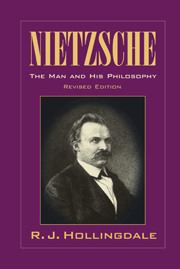Book contents
- Frontmatter
- Contents
- Preface to the Revised Edition
- A List of Nietzsche's Works
- Part I 1844-1869
- Part II 1869-1879
- Part III 1879-1889
- 8 The Turning-Point
- 9 The Wanderer
- 10 Lou Salome
- 11 Zarathustra
- 12 The Solitary
- 13 The Year 1888
- 14 The Revaluation
- 15 The Poet
- 16 The Collapse
- PART IV 1889-1900
- Postscript 1999
- Selective Bibliography
- Index
12 - The Solitary
from Part III - 1879-1889
Published online by Cambridge University Press: 13 September 2019
- Frontmatter
- Contents
- Preface to the Revised Edition
- A List of Nietzsche's Works
- Part I 1844-1869
- Part II 1869-1879
- Part III 1879-1889
- 8 The Turning-Point
- 9 The Wanderer
- 10 Lou Salome
- 11 Zarathustra
- 12 The Solitary
- 13 The Year 1888
- 14 The Revaluation
- 15 The Poet
- 16 The Collapse
- PART IV 1889-1900
- Postscript 1999
- Selective Bibliography
- Index
Summary
To live alone one must be an animal or a god—says Aristotle. There is yet a third case: one must be both—a philosopher. (G I 3)
After the completion of Zarathustra Nietzsche felt as if a weight had been lifted from him. The matter and the peculiar expressive manner of that book had been accumulating within him since his days at Pforta and had at length found impassioned release. The aftermath was not a feeling of exhaustion but one of freedom and new vigour. He now had a working hypothesis—the will to power—and he proceeded to develop it in a series of books comparable with the pre-Zarathustra trilogy: Beyond Good and Evil (1886), Towards a Genealogy of Morals (1887) and Twilight of the Idols (written 1888, published 1889). Stylistically these works are as different from Human, All Too Human as Human, All Too Human is from The Birth of Tragedy. There has been a marrying of the clarity and concision of the ‘free-thinking’ period with the passion of Zarathustra, and the child is a style of passionate conciseness that is seen to have been the style he was aiming for all along:
To create things upon which time tries its teeth in vain; in form and in substance to strive after a little immortality—I have never been modest enough to demand less of myself. The aphorism, the apothegm, in which I am the first master among Germans, are the forms of ‘eternity’ my ambition is to say in ten sentences what everyone else says in a book—what everyone else does not say in a book. (G IX 51)
The aphoristic form is gradually abandoned, but the spirit of aphorism—the summation of a lengthy process of thought in a single striking sentence— remains. In this sense Gotzen-Dammerung, the shortest of Nietzsche's important works, is an aphoristic summary of his entire thought.
The background to these publications (and to the short books of 1888 to be discussed later) is the unpublished material intended for what was to have been Nietzsche's major undertaking of the post-Zarathustra years: a largescale summary of his work called variously The Will to Power and The Revaluation of all Values.
- Type
- Chapter
- Information
- NietzscheThe Man and His Philosophy Revised Edition, pp. 169 - 192Publisher: Cambridge University PressPrint publication year: 1999



